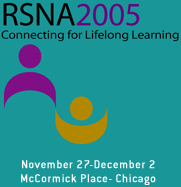
Abstract Archives of the RSNA, 2005
Katrin Eichler MD, Presenter: Nothing to Disclose
Stephan Zangos MD, Abstract Co-Author: Nothing to Disclose
Martin G. Mack MD, Abstract Co-Author: Nothing to Disclose
Thomas Lehnert MD, Abstract Co-Author: Nothing to Disclose
Matthias Heller MD, Abstract Co-Author: Nothing to Disclose
Thomas Josef Vogl MD, Abstract Co-Author: Nothing to Disclose
To evaluate the efficacy and tolerability of hepatic intra-arterial chemoembolization with gemcitabine as a cytostatic agent in pts with inoperable liver metastases of breast cancer.
Ongoing, open-label, single-center study design; pts had histologically confirmed breast cancer with inoperable liver metastases, adequate bone marrow reserve, sufficient liver/renal function, no active CNS metastases, KPS >70%, and life expectancy > 12 weeks. A suspension of gemcitabine 1,200 mg/m², 10 ml/m² of iodised oil (Lipiodol), and 5 ml of a degradable starch microsphere (Spherex) suspension, is administered intra-arterially up to 3 times every 4 wks. Dose-limiting toxicity (DLT) is defined as grade 4 thrombocytopenia, neutropenia, or nonhematologic toxicity > grade 3.
21 pts enrolled (median 56 yrs, range 48-65). All pts tolerated the treatment well, with no DLTs. Tumor response was evaluated by magnetic resonance (MRT) and computed tomography (CT) imaging. Imaging revealed a decrease in the degree of vascularisation of the treated metastases, which was verified as a reduction in the Gd-DTPA enhanced T1-weighted transverse and sagittal MRI scans. Imaging followup revealed a partial response in six patients, 10 stable disease and 5 progressed. Progression was verified as an increase in size of the lesions or newly developing lesions.
Hepatic intra-arterial chemotherapy with gemcitabine is well tolerated and achieves encouraging response rates in pts with liver metastases of breast cancer.
Eichler, K,
Zangos, S,
Mack, M,
Lehnert, T,
Heller, M,
Vogl, T,
Hepatic Intra-Arterial Chemoembolization with Gemcitabine: A Phase II Study in Patients with Liver Metastases of Breast Cancer. Radiological Society of North America 2005 Scientific Assembly and Annual Meeting, November 27 - December 2, 2005 ,Chicago IL.
http://archive.rsna.org/2005/4415180.html

